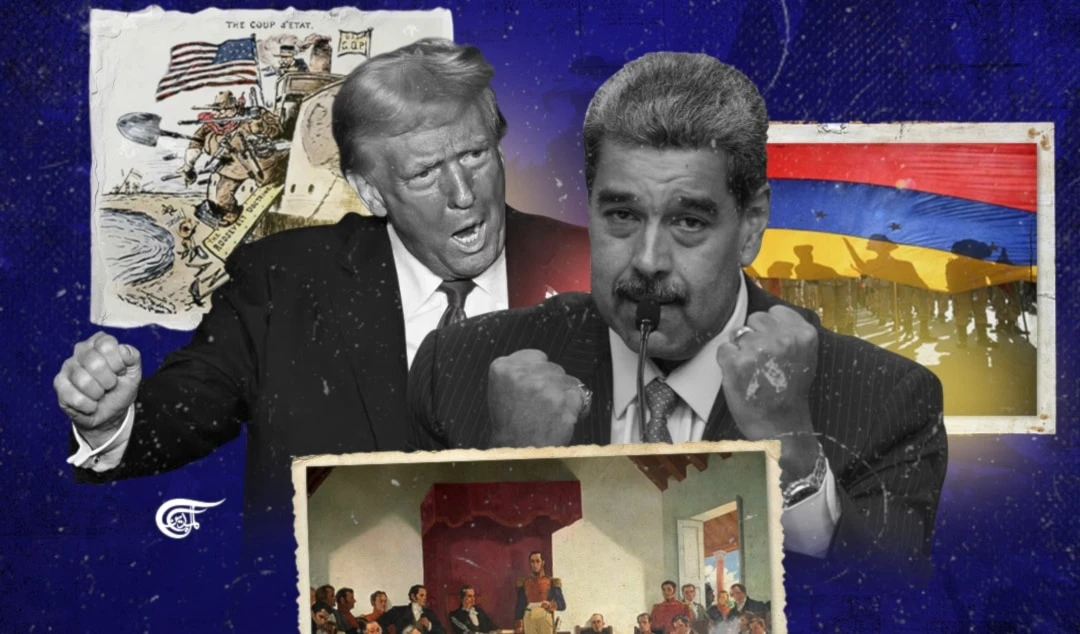Palestinian Resistance: Heroic example of the battle for national freedom
In our time, colonial Westernization has changed but remains with the same main goal: to deprive other peoples of their own culture and impose on them a Western view of the world.
-

The great Palestinian national resistance is an example that should motivate all the oppressed peoples of the Global South (Illustrated by Batoul Chamas; Al Mayadeen English)
Exactly 88 years ago, in April 1936, the Great Arab Revolt against the British colonialists and Zionist settlers began in Palestine. The first stage of the uprising was a general strike declared in the Palestinian city of Nablus. It was an absolutely peaceful action, which very soon was massively supported by the Arab population.
The British colonial administration immediately began to brutally suppress peaceful protests. Searches and arrests were carried out in Palestinian villages, and the British armed Zionist settlers with weapons. In response to these aggressive actions, many Palestinians joined the armed resistance against the colonialists.
If we analyze the events of 1936, we will understand that the British authorities and Zionist structures organized a total infringement of the indigenous Arab population of Palestine, land was taken from the Arabs and given to Jewish settlers, Arab workers were paid lower wages than Jewish workers, and the Arabs, who had lived in their homeland for centuries, faced the dire consequences of colonialism and occupation.
Just like 88 years ago, the Zionists, with the support of Western countries, continue their barbaric attacks on Palestinian land. The policy of seizing land and building illegal Zionist settlements became even more brutal than in the first half of the 20th century.
The Palestinians continue their courageous resistance, which is admired by people around the world. And this great resistance is not only a struggle in the name of defending the Motherland and independence; it is also a struggle to preserve one’s own identity. This is what I want to talk about in my article.
Since the inception of European colonialism until today, Western expansion in different parts of the world has always been accompanied by a policy of Westernization. This is the imposition of alien Western values on different peoples, an attempt to carry out cultural assimilation, pressure on the original traditions of peoples, and the forced introduction of Western models of behavior, thought, and ideology. This policy led to the fact that the peoples who were colonized were literally deprived of their own traditions, culture, and national and religious identity. In parallel with forced Westernization, colonialists organized the economic exploitation of foreign resources, using the captured territories as a raw material base for the metropolis.
In our time, colonial Westernization has changed but remains with the same main goal: to deprive other peoples of their own culture and impose on them a Western view of the world.
The tools of this process were Western propaganda, the idea of a “free, neoliberal market,” and the myth of American-European democracy.
With the first point, everything is very clear. Western official propaganda is aimed at forming an opinion among its consumers about the “advantages” of the Western way of life and political system. It uses false narratives and manipulation of mass consciousness to impose opinions that benefit it.
The idea of the "neoliberal market" is another example of modern forms of Westernization. The idea of an “omnipotent” market economy failed even in the West itself because they began to use a policy of economic sanctions (which completely contradicts the doctrine of the free market). However, the political establishments of the United States and the European Union continue to use the concept of the “free market” for their own purposes - for example, to continue to exploit the economic resources of foreign countries. Two more Western concepts stem from the idea of the “neoliberal market” - globalism and consumer society. In the first case, we are talking about an attempt to create a “single global economic environment” where there are no interstate borders, but there is total control on the part of Western transnational corporations. In the case of a consumer society, we are talking about a social model where all human life is built exclusively on the consumption of goods and services. There is simply no place left for the individual, sincere religious faith, traditions, and national, cultural, and historical identity in such a model of society. The emergence of such a dependence on the consumption of goods and services is another consequence of Westernization.
The myth of Western democracy and its “advantages” is another part of the propaganda foundation of modern Westernization. It consists of describing the imaginary advantages of the Western political system and imposing such a system on other states (mainly in the countries of the Global South, which are still subject to Western expansion). It is not difficult to debunk the myth of Euro-Atlantic democracy. There are so many social contradictions in the United States and the European Union that it has long been clear: democratic institutions there serve only as decoration, behind which completely different, openly tyrannical methods of governance are hidden. A striking example is the harsh pressure exerted by the highest governing bodies of the European Union on specific member states if their position differs from the opinion of the EU itself. What kind of democracy can we talk about in the case of the modern West? Only about pseudo-democracy, where the power of large corporations and the caste of the political elite is hidden behind external decorations.
As Western expansion continues, the traditions and national identities of many peoples around the world are being attacked. Globalism, which blurs borders, also blurs the self-awareness of entire civilizations. In the 21st century, the struggle of peoples for their own identity (national, religious, cultural) has become a continuation of the great anti-colonial struggle of past centuries.
The Palestinians in this case are an outstanding example of a selfless struggle for their own identity. While fighting for their land, they also defend their history, faith, culture, and traditions. By fighting against the Western-sponsored Zionist regime, the Palestinians are showing the world an example of courage, loyalty to their people, and readiness to resist. They don't just fight: they wage a holy struggle.
Moreover, the great Palestinian national resistance is an example that should motivate all the oppressed peoples of the Global South subject to expansionism and neo-colonialism. The modern world urgently needs new values - instead of those imposed on peoples as a result of Westernization.
Instead of globalism, the idea of national sovereignty and identity should prevail. Instead of the exploitative neoliberal "free market", international trade based on mutually beneficial cooperation should be applied. Instead of imposed Western ideologies, societies can rely on their own traditions, history, and culture.
In my opinion, the history of the Middle East shows us very clear examples of outstanding and just struggles - for one's own identity against colonialism and the illegal interference of the West. One can recall, for example, the hero of the liberation struggle for the independence of Algeria in the 19th century, Emir Abdelkadir, or the leader of the Palestinian national liberation resistance against the British occupation, Izz ad-Din al-Qassam.
And these historical national liberation movements are not just the past. They are based on three ideas: justice, the struggle for sovereignty, and the liberation of the people from colonial oppression. These ideas are quite suitable for the modern world. They can become the foundation for such a large-scale process as the emergence of a multipolar world. Meanwhile, this process itself can be called the revolution of the Global South. The destruction of the old, Westernized system of world order and the emergence of a new system - without unipolar dictate and Western hegemony.

 Alexander Tuboltsev
Alexander Tuboltsev
 7 Min Read
7 Min Read











